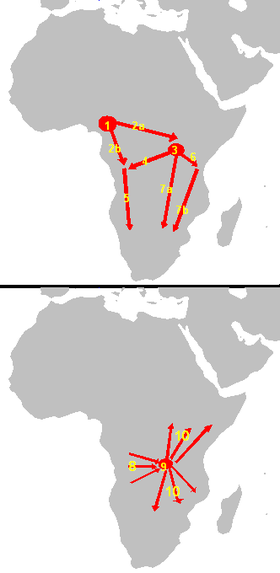Bantu peoples: Difference between revisions
No edit summary |
No edit summary |
||
| Line 4: | Line 4: | ||
==Definition== |
==Definition== |
||
"Bantu" is a Nguni (Xhosa, Zulu, Ndebele and Swati) |
In it's true sense,"Bantu" is a Nguni word (Xhosa, Zulu, Ndebele and Swati) which means "people". Dr. [[Wilhelm Bleek]] first used the term "Bantu" in its current sense in his 1862 book ''A Comparative Grammar of South African Languages'', in which he hypothesized that a vast number of languages located across central, southern, eastern, and western Africa shared so many characteristics that they must be part of a single language group. This basic thesis is still accepted by some people today, although the theory has been widely challenged since it was proposed - not least because a language may be spread by a relatively small number of human carriers. |
||
==Origins== |
==Origins== |
||
Revision as of 16:14, 11 July 2007

According to the western world and general mis-information, Bantu is a general term for over 400 different ethnic groups in Africa, from Cameroon to South Africa, united by a common language family (the Bantu languages) and in many cases common customs.
Definition
In it's true sense,"Bantu" is a Nguni word (Xhosa, Zulu, Ndebele and Swati) which means "people". Dr. Wilhelm Bleek first used the term "Bantu" in its current sense in his 1862 book A Comparative Grammar of South African Languages, in which he hypothesized that a vast number of languages located across central, southern, eastern, and western Africa shared so many characteristics that they must be part of a single language group. This basic thesis is still accepted by some people today, although the theory has been widely challenged since it was proposed - not least because a language may be spread by a relatively small number of human carriers.
Origins

2 = ca.1500 BC first migrations
2.a = Eastern Bantu, 2.b = Western Bantu
3. = 1000 - 500 BC Urewe nuclus of Eastern Bantu
4. - 7. southward advance
9. = 500 BC - 0 Congo nucleus
10. = 0 - 1000 AD last phase [1] [2] [3]

Before the Bantu, the southern half of Africa is believed to have been populated by Khoisan speaking people, today occupying the arid regions around the Kalahari and a few isolated pockets in Tanzania; whereas Cushites and other people speaking Afro-Asiatic languages inhabited north-eastern and northern Africa. Northwestern Africa, the Sahara, and the Sudan were inhabited by people speaking Mande and Atlantic languages (such as the Fulani and Wolof) and other people speaking Nilo-Saharan languages.
There are two basic theories of Bantu origins. The first was advanced by Joseph Greenberg in 1963. He had analyzed and compared several hundred African languages and found that a group of languages spoken in Southeastern Nigeria were the most closely related to languages from the Bantu group. He theorized that Proto-Bantu (the hypothetical ancestor of the Bantu languages) was originally one of these languages that spread south and east over hundreds of years.
This was quickly challenged by Malcolm Guthrie who analyzed each Bantu language and found that the most stereotypical were those spoken in Zambia and in the southern Democratic Republic of Congo (DRC). This provided the alternate theory that Bantu speakers had spread from this location in all directions.
Bantu expansion
A synthesis of these two theories would suggest that the Bantu first originated around the Benue-Cross rivers area in southeastern Nigeria and spread over Africa to the Zambia area. Sometime in the second millennium BC, perhaps due to pressure from people migrating away from the drying Sahara and into the region, they were forced to expand into the rainforests of central Africa (phase I). About 1000 years later they began a more rapid second phase of expansion beyond the forests into southern and eastern Africa. Then sometime in the first millennium new agricultural techniques and plants were developed in Zambia. With these techniques another Bantu expansion occurred centered on this new location (phase III).
By about 1000 AD it had reached modern day Zimbabwe and South Africa. In Zimbabwe a major southern hemisphere empire was established, with its capital at Great Zimbabwe. It controlled trading routes from South Africa to north of the Zambezi, trading gold, copper, precious stones, animal hides, ivory and metal goods with the Arab traders of the Swahili coast. By the 14th or 15th centuries the Empire had collapsed, with the city of Great Zimbabwe being abandoned.
Another theory held is that the Bantu originated from the Congo and due to factors like agriculture, trade in ivory they spread out to the north, east and the south. With slave trade the further scattered out across Africa some running from the slave traders. It has to be noted that although the Arabs were the main slave merchants some chiefs widely participated in the rise of slave trade as they sold on to the Arabs any captured prisoners of tribal clashes.
Bantu in South Africa
Black South Africans were at times officially called "Bantus" by the apartheid regime. The term "Bantu" is considered pejorative in South Africa. The term "Bantu" was a favorite of the South African apartheid regime, thus the term "Bantustan", used to refer to Black homelands (Transkei, Bophuthatswana, Venda and the Ciskei) which included both Nguni & non-Nguni speaking black South Africans.
Bibliography
- J. Desmond Clark, The Prehistory of Africa, Thames and Hudson, 1970
- April A. Gordon and Donald L. Gordon, Understanding Contemporary Africa, Lynne Riener, London, 1996
- Kevin Shillington, History of Africa, St. Martin's Press, New York, 1995 (1989)
